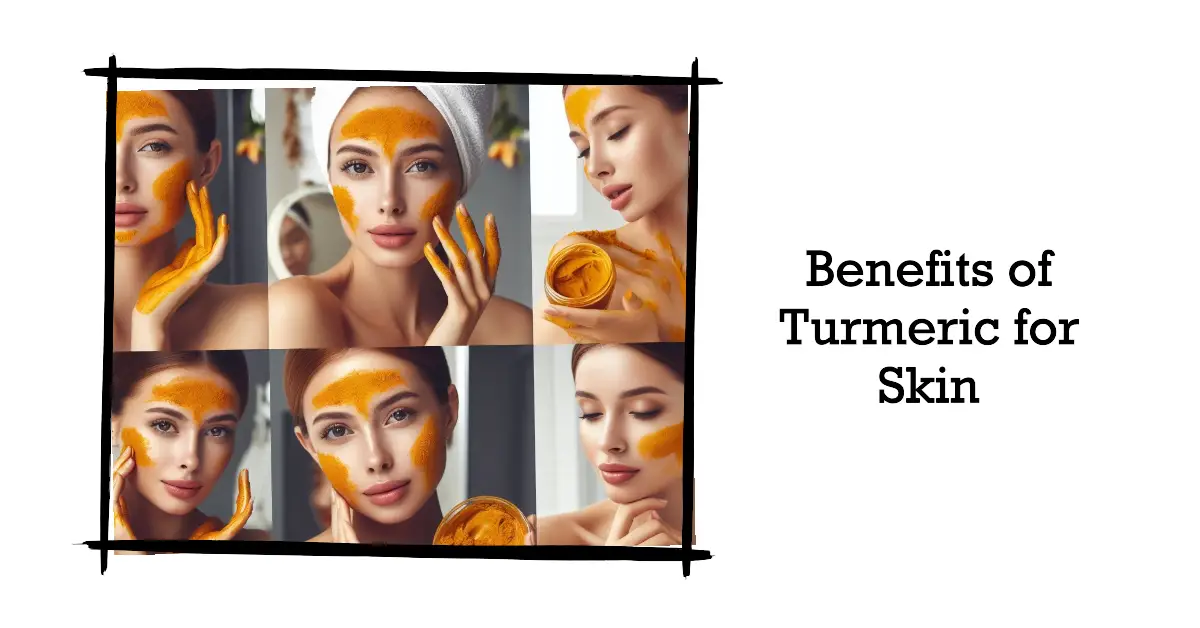
Turmeric is a spice that has been used for centuries in traditional medicine to treat a variety of conditions, including skin problems. It is known for its anti-inflammatory, antioxidant, and antiseptic properties.

Here are 20 benefits of turmeric for skin:
- Reduces inflammation: Turmeric is a powerful anti-inflammatory agent, which can help to reduce inflammation in the skin caused by acne, eczema, psoriasis, and other skin conditions.
- Fades dark spots: Turmeric contains curcumin, a compound that inhibits the production of melanin, the pigment that gives skin its color. This can help to fade dark spots and hyperpigmentation.
- Brightens skin tone: Turmeric’s antioxidant properties can help to brighten skin tone and improve overall complexion.
- Reduces acne: Turmeric’s antibacterial and anti-inflammatory properties can help to reduce acne breakouts and heal acne scars.
- Exfoliates skin: Turmeric can be used as a natural exfoliator to remove dead skin cells and reveal brighter, smoother skin.
- Protects from sun damage: Turmeric’s antioxidant properties can help to protect the skin from sun damage and premature aging.
- Soothes irritated skin: Turmeric’s anti-inflammatory properties can help to soothe irritated skin caused by sunburn, eczema, and other skin conditions.
- Reduces oil production: Turmeric can help to reduce excess oil production in the skin, which can help to prevent acne breakouts.
- Moisturizes skin: Turmeric is a natural moisturizer that can help to keep the skin hydrated and soft.
- Reduces the appearance of wrinkles: Turmeric’s antioxidant properties can help to reduce the appearance of wrinkles and fine lines.
- Reduces the appearance of stretch marks: Turmeric can help to reduce the appearance of stretch marks by increasing collagen production and improving skin elasticity.
- Helps to heal wounds: Turmeric’s anti-inflammatory and antibacterial properties can help to heal wounds faster and reduce scarring.
- Protects from skin cancer: Turmeric’s antioxidant and anti-inflammatory properties can help to protect the skin from skin cancer.
- Reduces the appearance of rosacea: Turmeric can help to reduce the redness and inflammation associated with rosacea.
- Reduces the appearance of eczema: Turmeric can help to reduce the itching and inflammation associated with eczema.
- Reduces the appearance of psoriasis: Turmeric can help to reduce the redness, scaling, and inflammation associated with psoriasis.
- Reduces the appearance of vitiligo: Turmeric can help to repigment the skin in people with vitiligo.
- Reduces the appearance of melasma: Turmeric can help to fade the dark patches associated with melasma.
- Reduces the appearance of hyperpigmentation: Turmeric can help to fade dark spots and hyperpigmentation caused by sun exposure, acne, and other factors.
- Improves skin overall health: Turmeric’s antioxidant and anti-inflammatory properties can help to improve the overall health of the skin by protecting it from damage and promoting healing.
How to use turmeric for skin
Turmeric can be used for skin in a variety of ways. It can be applied topically to the skin in the form of a powder, paste, or mask. It can also be added to baths or body washes. Turmeric can also be consumed orally in the form of capsules, teas, or smoothies.
Conclusion
Turmeric is a safe and effective natural remedy for a variety of skin conditions. It is affordable and easy to find, and it can be used in a variety of ways. If you are looking for a natural way to improve the health and appearance of your skin, turmeric is a great option to consider.




